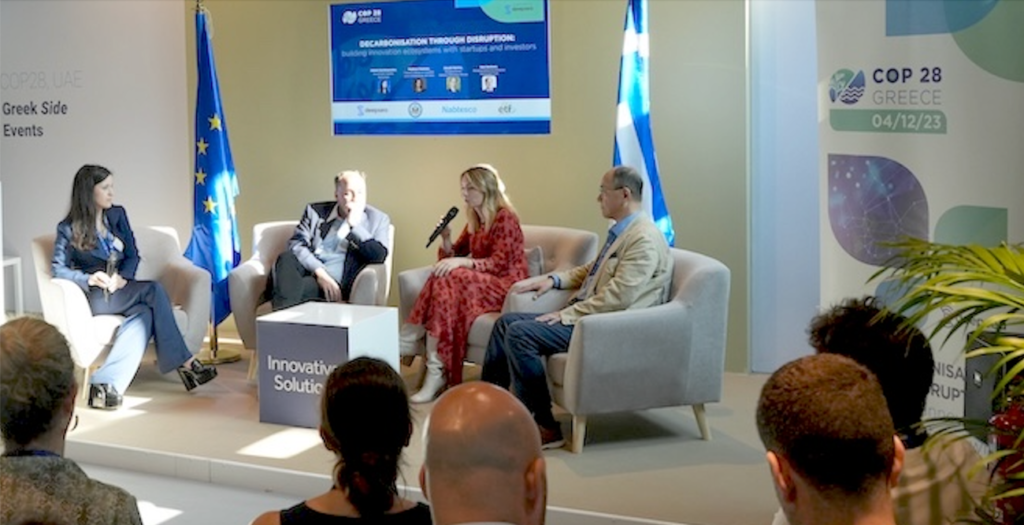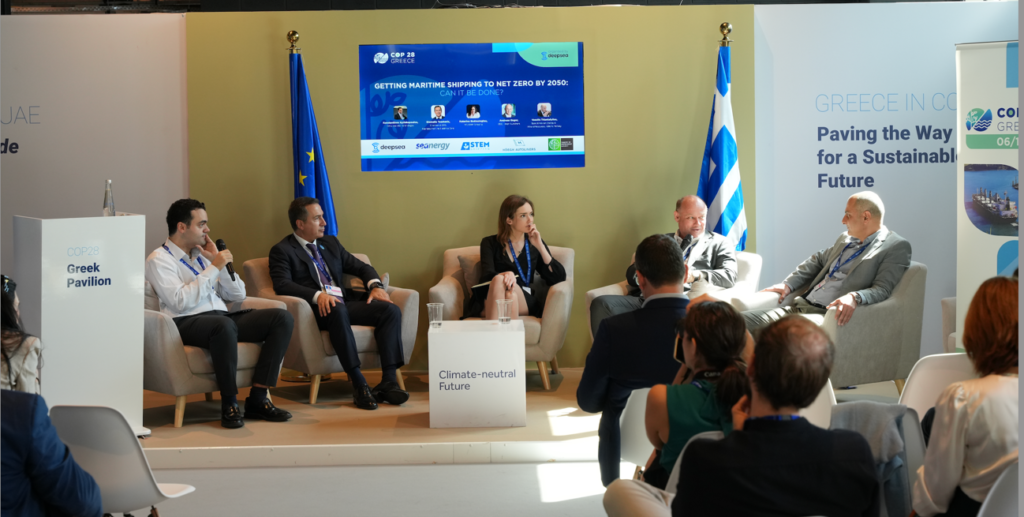Climate change initiatives for creating innovation ecosystems for startups, venture companies, and investors and achieving net-zero maritime transport by 2050 were the subject of a panel discussion held in the Blue Zone’s Greek Pavilion at COP28. NTV Managing Partner Hiroshi Nerima attended as a panelist.
December 4, 2023 | Greek Pavilion, Blue Zone, COP28, Expo City, Dubai
Decarbonization Through Disruption: Building Innovation Ecosystems with Startups and Investors
DeepSea Technologies, a company headquartered in Greece and part of the Nabtesco Group, held a discussion on the importance of innovation and disruption in the battle to achieve decarbonization and the importance of startups and venture companies, and the investors who support them.
Panelists included Hiroshi Nerima (Nabtesco Technology Ventures Managing Partner, Nabtesco Corporation Executive Officer), Rob Geneiser (Environmental Technology Fund Managing Partner), Madison Freeman (former advisor to US Climate Envoy, John Kerry), and Alkistis Kyriakopoulou (Chief of Staff at DeepSea Technologies) moderated the panel.

From the left: Kyriakopoulou, Geneiser, Freeman, Nerima
Speaking for Nabtesco, a company with around 8,000 employees, Nerima explained their eagerness to learn from startups and the importance they place on it as a company. “Large corporations need to relearn the entrepreneurial spirit from startups. It’s crucial that experienced global companies forge partnerships with vibrant startups,” he said, explaining the rationale behind Nabtesco’s acquisition of DeepSea Technologies.
EFT Partners’ Geneiser encouraged new graduates to consider a career in an environmental startup, stating that such companies have the power to influence the future through innovative technology, which can help provide solutions to the climate crisis.
The panel discussion focused on how the partnership between Nabtesco and DeepSea has been strengthened by the recent acquisition, which serves as a case study for improving climate outcomes by combining the strengths of startups with those of established companies. DeepSea’s technology has been proven to reduce fuel consumption in ships by 7%, and with the support of industry leader Nabtesco, which serves 40% of the world’s ships, this technology is expected to spread globally.

Hiroshi Nerima, NTV MP and Nabtesco Corporation Executive Officer
The speakers emphasized the importance of cross-border cooperation to overcome challenges related to climate change.
“There should be no geographical limitations when it comes to technology funding. In the realm of deep-tech, which is predominantly B2B, competition is global, so funding should also be global,” said Nerima.
Geneiser emphasized that a “global mindset in entrepreneurship and financial support is needed to effectively address environmental challenges.” He added that “although climate tech investment in the US and Europe has declined by approximately 60%, the underlying businesses are thriving, making them a worthwhile investment option. So, despite the hurdles in raising funds, environmental start-ups can end up making a significant contribution to humanity.”
Commenting on the issue of reduced access to funding in the current economic climate, Nerima noted that “corporate venture capital in Japan remains healthy due to government support and favorable interest rates. In order to capitalize on this, it is necessary to increase the number of well-qualified players from venture capital and equity finance.”
To conclude the discussion, the panel agreed that the issue of sustainability is a shared global responsibility.
December 6, 2023 | Greek Pavilion, Blue Zone, COP28, Expo City, Dubai
Net-Zero Maritime Shipping by 2050: Can It Be Done?
DeepSea Technologies, a Greek company in the Nabtesco Group, brought together industry experts to discuss achieving net-zero emissions in the shipping industry by 2050. Emissions from the global shipping fleet broke new records last year, triggering urgent discussions about the industry’s future.
Panelists included Stamatis Tsantanis (CEO of Seanergy Maritime), Katerina Bodouroglou (Managing Director of STEM Shipping), and Andreas Enger (CEO of Höegh Autoliners). The panel was also joined by Konstantinos Kyriakopoulos (CEO of DeepSea Technologies), who served as the moderator, and Vassilis Triantafyllos, a lawyer and energy transition expert from the Greek Ministry of Energy.

From the left: Kyriakopoulos, Tsantanis, Bodouroglou, Enger, Triantafyllos
The discussion centered around the issue of achieving the industry’s goals as set by the International Maritime Organization (IMO), which call for a 20% emissions reduction from 2008 levels by 2030, a 70% reduction by 2040, and net-zero emissions by 2050.
Kyriakopoulos, whose company helps ships save up to 7% in fuel consumption using AI, led the panel discussion in discussing the immediate challenge of increasing the efficiency of existing ships in relation to the 2030 target.
“As one of the pioneers in adopting digital solutions for ships, we have been using DeepSea, one of the world’s most advanced tools, to optimize ship efficiency. The 20% reduction in greenhouse gas (GHG) emissions by 2030 and the realization of zero emissions by 2050 are achievable goals for shipping companies with the right clientele and fleet lineup,” said Tsantanis of Seanergy Maritime.
Enger emphasized Höegh’s dedication to achieving these goals, announcing plans to achieve net-zero emissions by 2040, well ahead of the IMO’s targets, by investing in a vast fleet of new dual-fuel, ammonia, and methane-ready ships. “We believe in the importance of providing options for our cargo owners, and that being a prime mover in the industry is a good thing,” he said. Zero-carbon fuels are more costly, so operational efficiency is even more important, so the use of digital solutions like AI tools is crucial.
STEM Shipping’s Bodouroglou noted that even slight changes in speed greatly affect fuel consumption. “By slowing down we can cause significant and immediate changes to emissions at sea.” Regarding the financial implications, she stated that, “our planet can accommodate a decrease in pace.”
The speakers agreed that one of the major challenges in decarbonizing maritime transport is the current Rush-to-Wait phenomenon (the tendency to sail fast and then wait in line at ports), and the lack of awareness of the fact that waiting times at ports actually increase emissions. To achieve net-zero emissions by 2050, it is extremely important to coordinate the supply chain.
They wrapped up the discussion by unanimously concurring that collaboration, innovation, and a multi-faceted approach are needed to realize a sustainable and decarbonized future for the maritime shipping industry.
